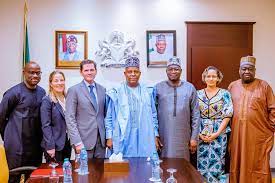This week, Vice President Kashim Shettima said that education and skills development are the panacea for addressing poverty and hunger in Nigeria.
The Vice President said this during a meeting with a delegation from the Bill & Melinda Gates Foundation led by the President of its Global Growth and Opportunity Division, Mr Rodger Voorhies, at the Presidential Villa in Abuja.
For decades, the international community has recognised education as a fundamental human right and lack of education is widely linked to poverty. Research reiterated that education is not only an end in itself but also a means to achieving a broad global development agenda.
Poverty or education, which comes first? Some may argue that nations by being rich are able to afford quality education and become human resource efficient but some may also say that because a nation gives utmost priority to education, it is able to build an effective and efficient human capital and become rich.
However, poverty exists all over the world and can be perceived or defined in different ways depending on the context. In the case of Nigeria, the role of education in poverty alleviation cannot be overemphasised. Education and poverty are two very important subjects that are of high significance in determining a country’s growth, development and global importance.
Every nation, including Nigeria, therefore, needs to actively pursue initiatives that improve their educational standards and reduce poverty sustainably.
In Nigeria, approximately 50% of the estimated 200 million population live in poverty. In 2018, the World Poverty clock estimates that Nigeria has the highest number of people living in extreme poverty.
These trends point to the need to rethink and rejig the government’s approach to poverty alleviation.
In rethinking Nigeria’s current approach, there are important lessons that could be drawn from emerging economies like China. Between 1990 and 2015, China effectively lifted 745 million out of poverty. This contributed to about 70% of the global poverty reduction over the period and the achievement has been described as the most impressive economic miracle in development history.
While the roles of market reform, trade openness and state-led development initiatives in this ‘economic miracle’ are well documented, the role of education in the broader poverty alleviation strategies has been less emphasised. However, some economists draw attention to the role of education in Chinese development narrative and there are many important lessons for countries like Nigeria which is facing similar developmental challenges.
For a start, vocational education was given priority among other levels of education in China. The elevation of the status of vocational training allowed a wider demographic of individuals (young and old) to acquire the benefits of skill development in the short-run through a flexible programme.
The programme ensured that the skills supplied within these communities matched local demand in order to effectively impact their experience. It also reduced the level of rural to urban migration as the campaign provided local opportunities, developed human capital within the rural areas which consequently broadened their capability.
Although Nigeria has set up vocational training programmes both in the formal 6-3-3 education system, as well as state governments and civil societies facilitated programmes, its impact is limited. This is because the programme is not widespread, lacks permeability and the programs are not standardised in delivery.
Similarly, the lack of an overarching initiative focused on skill acquisition in the Nigerian education system limits its impact on poverty alleviation and also exclude some demographic groups in the development process.
It should be noted by the authorities in Nigeria that ducation policy is considered as a subset of the grander economic policy, as such education policy should be jointly designed and implemented by the ministries of finance and education.
The synergy between the finance and the education ministry should cover standardisation of education structures across various regions as well as teacher’s training and placement programme.
The understanding that education policy is directly related to economic policy is one crucial area that presents an apparatus for policy design which Nigeria can learn from. For instance, the problem of out-of-school children in the Northern Nigeria, many scholars have observed that poverty and other economic fundamentals play a role in the problem. However, policy interventions to address the problem have concentrated mainly on education sector driven solution like building more schools.
Predictably, most of the education interventions to out-of-school children issues in Nigeria have failed to deliver the expected outcome. Again, China’s approach to economic planning through mainstreaming poverty alleviation programmes into the education policy could help Nigeria to simultaneously tackle the education and economic challenges.
In the end, while the Chinese experience serve as a model for Nigeria in using education and skills to fight poverty, Nigerians should understand that the fight does not belong to or begin or end with the government alone. We are all involved in the fight against poverty and the efforts to improve our quality of education.




